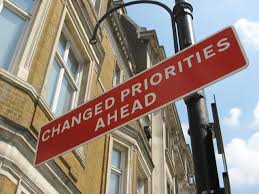Have you ever been deep in thought or just hit your stride on a project only to have it snatched away with a phone call, an incoming email that you caught from the corner of your eye, or worse, a loud ding from a device you’re working with? Research has proven that it will take you up to seven times longer to come up with the thought you just had than it took for the original idea.
You must build in time for the unexpected—or as the business world affectionately calls them, fire drills. In an article entitled “Don’t Let Technology Take Over,” Dave Beck references a Basex study of over one-thousand office workers showing that interruptions consume more than two hours, or twenty-eight percent of a typical workday. To quote the article, “More than half of those surveyed said they open email immediately or soon after it arrives, no matter how busy they are. The two hours of lost productivity included not only unimportant interruptions and distractions…but also the recovery time needed to get back on task. The study found that based on an average salary of $21 per hour for ‘knowledge workers’ whose jobs involve information, workplace
interruptions cost the U.S. economy $588 billion a year.”
Have you accounted for these two hours in your calendar? Have you trained yourself to jump in to actually deal with these interruptions? Think about how you schedule your day. If you schedule all eight hours in a work day, you are guaranteed to not meet everything that’s on your calendar. Look at your schedule for the coming week and start to block off time to account for fire drills—the things you didn’t plan on dealing with today, but have no choice. Maybe the few minutes here and there don’t need to make your calendar to deal with those small tasks, but you may need to account for it in other administrative or work action time. For example, if it takes you thirty minutes to typically do paperwork daily, schedule an hour for administrative purposes. Next, it’s time to schedule specific time for real-work action like responding to emails and returning messages. Personally, I prefer the quiet morning time for email and later in the morning for phone calls, when possible. Next, identify other x-factors such as busier days of the week or seasonality, and make the adjustments. As another example, when I was a manager in a call center, we knew the call volume was heaviest on Mondays, so we built time for managers to be on the floor with the people on the phones that day, and made a point not to schedule Monday staff meetings.
You may be asking yourself, “Why does scheduling stuff I know I need to do each day need to make my calendar?” You probably already know that if you don’t schedule it, it may not get done. Having the actual reminder will prompt you to get to it. These scheduled periods of time become a barrier of protection to show you what’s supposed to be done today. The phrase supposed to is italicized because we know that planning a day doesn’t always mean that’s how the day will play out. By scheduling administrative work and overestimating the expected time, you are leaving a fire drill cushion.
You can’t control all the interruptions that may come your way, but you can control your reaction to them. You don’t want to be a slave to your calendar, but you do want to be committed to it when you can. Let’s go back to the paperwork example. If you actually completed it in the expected time of thirty minutes and had no interruptions, you bought yourself some extra time to pull future work in from other days. If you did have some fire drills to deal with, you accounted for much of this with the reserved blocks of time.
Thomas B. Dowd III’s books available in softcover, eBook, and audiobook (From Fear to Success only):
- Down the Chute: A Toboggan Tale (children’s book)
- Now What? The Ultimate Graduation Gift for Professional Success
- Time Management Manifesto: Expert Strategies to Create an Effective Work/Life Balance
- Displacement Day: When My Job was Looking for a Job…A Reference Guide to Finding Work
- The Transformation of a Doubting Thomas: Growing from a Cynic to a Professional in the Corporate World
- From Fear to Success: A Practical Public-speaking Guide received the Gold Medal at the 2013 Axiom Business Book Awards in Business Reference
- The Unofficial Guide to Fatherhood
See “Products” for details on www.transformationtom.com. Book and eBook purchase options are also available on Amazon- Please click the link to be re-directed: Amazon.com










